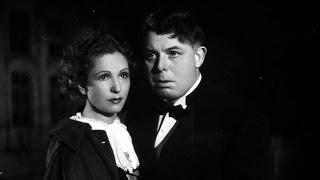"The awful thing about life is this: everyone has their reasons."
Jean Renoir's The Rules of the Game (1939) wasn't appreciated in its day; its social satire and downbeat conclusion alienated French viewers, and it was banned upon the outbreak of World War II. With the original prints destroyed in an air raid, only an 85 minute reedit survived for international audiences to dismiss. It wasn't until the late '50s that a restored version surfaced, achieving acclaim as a high point in French cinema.Aviator Andre Jurieux (Roland Toutain) becomes a national hero after a record-setting transatlantic flight. He's too depressed to enjoy the acclaim, upset that his lover Christine (Nora Gregor) refuses to meet him. Christine's married to Robert (Marcel Dalio), a French Marquis who's carrying on with his mistress, Genevieve (Mila Parely). These relationships grow more entangled still when Andre and Robert's mutual friend Octave (Jean Renoir) arranges for them to visit the Marquis's estate in Sologne. This sets in motion a roundelay of rage, betrayals and farce, culminating in violence.
Seen today, The Rules of the Game anticipates myriad class-driven ensembles from Gosford Park to The Shooting Party. Yet Renoir's film is more cutting than most of its imitators, expending rage upon a society rigid in its social structures, riven with corruption and complacency, destroying itself from within. It's a tale of cultural languor and decadence told with uncommon sophistication.
Renoir stresses the class distinctions: nobles like Robert celebrate Andre as a hero while holding him in contempt; Christine finds him an interesting toy, yet doesn't consider a suitable match. This resentment extends to servants like Schumacher (Gaston Modot), a trigger-happy groundskeeper, and maid Lisette (Paulette Dubost), who's more attached to Christine than her husband. There's little tension between them, with both complicit in enforcing social structures: Schumacher's too angry about an interloping poacher (Julien Carette) to worry about oppression. It's middle class interlopers like Octave, who tries navigating both worlds (and himself pines for Christine), who invites trouble.
Rules stresses its social commentary through elaborate set pieces. There's the requisite shooting party, where Robert invites his friends to blast rabbits with shotguns (shown in graphic detail), which leads to violent competition between his guests. There's also a prolonged theatrical interlude, with the stage show reflecting the shifting character dynamics: a musical farce whose performers are shown, in chaos, by a curtain inopportunely opening; or a danse macabre counterpointing Christine's romantic triangulations. It spills into violence when Robert confronts Andre, an amusing chase scene which provides comic foreshadowing for the finale.
Renoir makes marvelous use of his ensemble cast. Roland Toutain plays the straight man, his befuddled celebrity becoming poignant rather than ridiculous. Marcel Dalio plays an upright noble comfortable in indulging hypocrisy, until the consequences confront him head-on. Nora Gregor provides mischievous, Paulette Dubost and Mila Parely exasperation. Renoir himself provides an anchor of sanity, doing his best to cut through the mischief.
The Rules of the Game ends on a sublimely dark note, with Andre and Octave forging an accord over Christine. Just as an inter-class connection seems possible, a shotgun intervenes; tragedy snaps Robert and his guests back into their rigid public roles. So much for connection and understanding; everyone must follow the rules of the game, even unto their own destruction.


